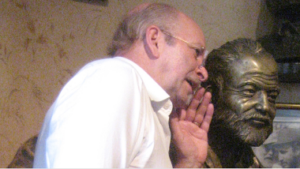I first read Hemingway at college in 1978, an intro course called Modern Existential Literature. The Old Man and the Sea was like looking at an x‑ray to see how we are put together. The Sun Also Rises was a look at how we fall apart. It was also a siren’s call: “This way, follow me.”

In spring 1980, I had five hundred bucks, a Eurail Pass and a backpack, and two months in which to see as much of Europe as I could. From Paris, following the characters from Sun, the train took me as far as Bayonne and from there it was thumb out. An old man named Jesus picked me up in a white car and drove me up the mountain to Pamplona. As a boy during the San Fermin festival, he had shaken Hemingway’s hand. When I got out of the car and he shook my hand, I was convinced if not a torch at least a spark had been passed.
At its best, youth is designed for seeing the future brightly in that way. Hope, optimism, ego, not knowing yet one’s own limits.
Not another inch before pointing out, I hated the isms. Racism, sexism, antisemitism. Did the schmuck Robert Cohn in Sun really need to be Jewish? The answer for Hemingway was yes. One would not want to have brown or black skin in one of his stories. And if your name was Martha Gelhorn, you clearly did not get what being a wife was all about. Still, where there are shadows there is light. Hemingway fought against fascism, and not everyone then or now does that.
What to do, what not to do. He had both covered.
I wanted to be a writer. He could do more with six words than anyone else could do with twelve, so I embraced him as my teacher. Boil the stock down until, the steam away, it is thick with the essence of a thing. It isn’t about doing it all but trying to, and the real story is in the trying. Not every hero gets a medal, certainly not all who get medals are heroes. Even the fastest horse collapses at the end.
He had the hunter’s eye for spotting things, the fisherman’s hand at catching them, and the sherpa’s skill at guiding us to places where discount airlines didn’t fly yet. Wherever he took us it was a frontier, even if that meant a taxi through Madrid. It was all nature, because people are animals.
Most of us make out pretty well in our own stories. Even if we lost a thing, we were the heroic victim and lost through no fault of our own. We are that old man in the sea, we tell ourselves. Even sharks are surrounded by sharks.
I felt less lonely after ‘meeting’ Hemingway. For some, Virginia Woolf will do that. Or Dalí. Or DMX. Or Amanda Gorman. Resonant frequencies. I loved places with people and places without people, and his stories offered both. No false choices, full menu.
Over decades, Hemingway was often an American abroad. My tribe if I have one. I first came to Europe as a two-year old in 1958, and have been back dozens of times. Not just to visit, but to live. England, Spain, Croatia, Poland, Austria, Germany. Hemingway understood that ultimately it’s not the place you’re out to know as much as yourself, and that takes time.
In 1984, living in the fishing village La Herradura in the south of Spain, I fell, drunk, from my fourth-floor balcony overlooking the sea. Eight days then in a tired old hospital in Granada. A year then in a cast with crutches, back on my balcony. Fishermen stuck torches in the pebbled beach below me as they pulled their nets in before dawn.
I wrote my first book that year. To stretch our limits, we must first reach them.
I’ve made many of the pilgrimages. Walked up the Rue du Cardinal Lemoine at sunrise trying to see, smell, hear, feel everything before the crowds came with their cameras. Made friends with a guide in Key West, Joe, who let me sit at Hemingway’s desk. And in 2013, my wife Katarina and I went to Cuba.
After reading my book Nothing Lasts Forever Anymore, written in that fishing village where I had lived, the director of Hemingway’s house-now-museum, Ada Rosa Alfonso Rosales, let me spend a full two hours inside his house. Just Ada, Kati, me, and the guard watching our every move to make sure we didn’t pinch this or that. Hemingway and Mary had left everything, expecting to return. Those really were his pencils, his shoes, his postage stamps. Like any pilgrim, I felt the spirit.
After our visit, Ada offered me a job. Hemingway had left behind some 9,000 books, many with his marginalia. Would I like to come stay a month or more and transcribe his handwritten notes into a computer. Tempting as that was, I declined. Mistake. I was writing my own first full-length novel then, Cadaques, about an American alcoholic writer in Spain who had nothing to do with Hemingway, but everything to do with me. I didn’t want to stop my work to study someone else’s. Not even his.
Aside from Shakespeare, no other writer ever touched me as he has. Since I’ll never have the chance to thank him, I do that here.
21,258 Total Views, 7 Views Today






